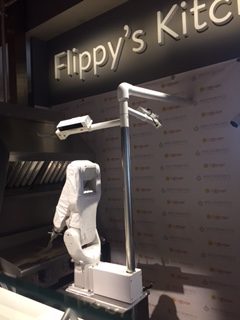With California losing a seat in the U.S. House because due to its flat population growth, maybe Sacramento should try to convince Washington to count robots as residents in the next census. Because they’re on their way.
In the first nine months of 2021, North American companies “added a record number of robots” to their “staffs,” Reuters is reporting.
“Factories and other industrial users ordered 29,000 robots, 37% more than during the same period last year, valued at $1.48 billion, according to data compiled by the industry group the Association for Advancing Automation. That surpassed the previous peak set in the same time period in 2017, before the global pandemic upended economies.”
The surge is being attributed to the “labor shortages throughout manufacturing, logistics and virtually every industry,” says Jeff Burnstein, president of the Association for Advancing Automation.
“Companies of all sizes are increasingly turning to robotics and automation to stay productive and competitive.”
But there are other reasons to employ robots, and Sacramento has provided businesses with 14 of them – as in the minimum wage of $14 an hour for companies with 26 or more employees, the highest in the nation. Of course it doesn’t stop there. By Jan. 1, 2023, all companies in the state will have to pay their workers at least $15 an hour.
California lawmakers have known for some time their policies are driving employers away from workers and toward machines. That’s why they have been “studying punitive measures against companies that use workplace robots.”
Robots aren’t an enemy to be vanquished, though. They’re simply a tool businesses can use to avoid the burdens of poor public policy, and quite a few California businesses are already doing just that. In one recent instance, grocers put machines to work scanning shelves to monitor inventory. The roving robots are being tested “as a way to cut costs by replacing humans with machines for certain tasks,” says Fortune.
“Because of rising minimum wages, particularly in California, grocers believe that automation technology will help improve their profit margins.”
Brad Bogolea, chief executive of Simbe, the company that makes the shelf-scanning robots, told Fortune that “in California, the minimum wage is going to turn many of these grocers over their heads.”
Bogolea isn’t simply repeating a political talking point. The Federal Reserve Bank of St. Louis has noted that hiking “the minimum wage provides economic incentives for firms to adopt new technologies that replace workers.”
“A higher minimum wage raises the cost of labor and increases the range of tasks that are susceptible to displacement by automation – especially the tasks of minimum wage jobs, which tend to be labor intensive and composed of low-skill tasks.”
Consequently, those who can least afford to be harmed financially are hurt the most by government-mandated wage floors. It’s one of the oldest stories of state intervention into private economic matters: The intended beneficiaries of any given policy turn out to be its victims.
Lawmakers can’t say they were surprised that the increases in the minimum wage they dictate are forcing businesses to adopt robotics. In 1965, renowned economist Yale Brozen said “the overpricing of labor,” not automation, has “caused unemployment because many are not productive enough to be employed at these wage rates.”
“Don’t Fear Automation,” said the headline of his essay published in the Chicago Booth Review of the University of Chicago Booth School of Business. Instead, it wisely suggests, we should “Fear the Minimum Wage.”
Kerry Jackson is a fellow with the Center for California Reform at the Pacific Research Institute.

